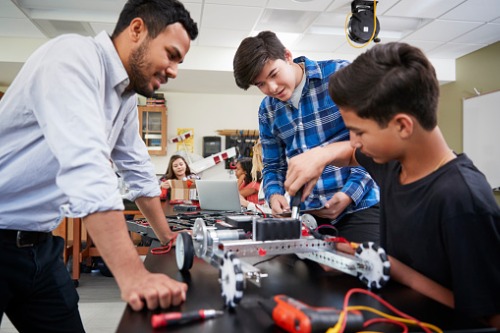
When it comes to guiding senior students to explore their career options, universities often go above and beyond.
Charles Sturt University, for example, recently reached out to Wagga Wagga high school students through its Future Moves program. The University took part in the Smith Family’s Speed Mentoring program at Mount Austin High School.
“Future Moves targets school students who may not have thought of University or higher education as a realistic option, and aims to break down the barriers that may be holding students back,” Future Moves program coordinator Matt Harrigan said.
“We are there to provide a link to university aspiration.”
Students who took part in the event are encouraged to consider a career in defence, web design, photography, cosmetology, media, psychology, law, childcare, hospitality and construction.
But as the nature of work continues to undergo rapid change, senior students are set to face more career options than ever before.
Changing workforce, traditional education
Dr Patrick Garcia, an associate professor of management and Organisational Behaviour at Macquarie Business School, noted that having more choices means incoming workers will end up having more uncertainty about what career to pursue.
“The days of the predictable linear career where employees rely on organisations for career growth and development are long gone,” Dr Garcia said.
“Technology, globalisation and intense competition have created a sense of career uncertainty and job insecurity.”
Despite this, a large number of Year 12 students would still prefer to go the traditional route by choosing to attend university, according to a background paper used by the review of senior secondary pathways.
The background paper also noted that more than half of school leavers don’t know how to get into vocational education and training (VET), possibly barring them from another option after leaving school.
Likewise, a NSW survey released early this year found that parents aren’t promoting VET to their children, and 27% even have a negative opinion of VET.
The survey also noted that 85% of male respondents and 74% of female respondents who were aged 15 to 21 felt pressured to attend university.
Making VET more accessible
As state governments move to improve their education sector, some recognised that not all students are meant to go to university.
The NSW government, which had its education sector reviewed by the Australian Council for Educational Research, is one example.
As more students continue their studies after completing Year 12, NSW Premier Gladys Berejiklian last week announced a new program to incentivise high- achieving school leavers to study at TAFE NSW.
The program, Berejiklian said, will let school leavers build their skills needed for emerging industries to prepare them for the jobs of the future – particularly in advanced manufacturing, technology and engineering.
“We want universities and VET to be thought of in the same sentence for young people looking to prepare themselves for the high value jobs of the future,” she said.
Minister for Skills and Tertiary Education Geoff Lee noted that with almost a quarter of students attend university end up dropping out, they might instead be more suited to learn a trade instead.
“Educational research identifies that some students are feeling pressured to go to university, regardless of whether it’s the best option for their future careers,” Minister Lee said.
Under the program, the state government will be mapping HSC units – such as mathematics, engineering, industrial technology and software design – to vocational competencies.
High-achieving students who are considered eligible to study at TAFE NSW can immediately undergo assessments.
Aside from NSW, South Australia is also making VET more accessible to Indigenous senior high school students.
The South Australian Secondary Training Academy recently announced a partnership with construction company Hansen Yuncken and Aboriginal-owned Registered Training Organisation Cary Training to provide Aboriginal senior students more opportunities past secondary education.
The partnership, which will start its program in February 2020, will provide a “culturally appropriate and engaging environment” for Indigenous students. Hansen Yuncken will be providing a purpose-built classroom at one of their sites in Adelaide.
Initially up to 12 students will have the chance to earn a Certificate II in Construction upon finishing the course. They will also have a higher chance of finding work through networks they developed over the course of the program.


